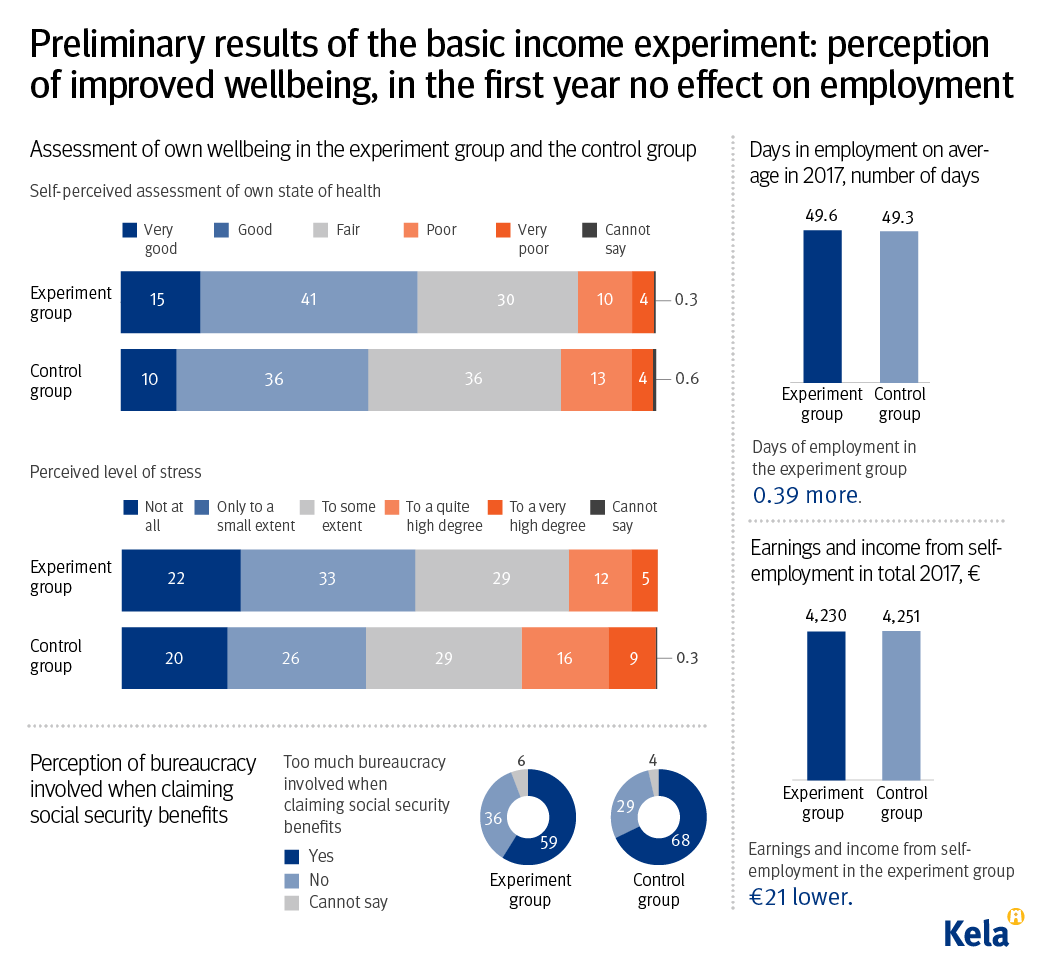February 11, 2019
Basic income experiment increased wellbeing but did not encourage people to find work
 Giving jobless people in Finland a basic income for two years improved their self-perceived wellbeing but did not lead them to find work, researchers have concluded. In the trial, from January 2017 until December 2018, 2,000 unemployed Finns were paid a monthly flat amount of €560. The aim was to see if a guaranteed payment would help people to find jobs and support them in taking on more insecure work. While employment levels did not improve, participants reported to the researchers that they felt happier and less stressed.
Giving jobless people in Finland a basic income for two years improved their self-perceived wellbeing but did not lead them to find work, researchers have concluded. In the trial, from January 2017 until December 2018, 2,000 unemployed Finns were paid a monthly flat amount of €560. The aim was to see if a guaranteed payment would help people to find jobs and support them in taking on more insecure work. While employment levels did not improve, participants reported to the researchers that they felt happier and less stressed.
When it launched the pilot scheme back in 2017, Finland became the first European country to test out the idea of an unconditional basic income. It was run by the Social Insurance Institution (Kela), a Finnish government agency, and involved 2,000 randomly-selected people on unemployment benefits.
 The basic income experiment did not increase the employment level of the participants in the first year of the experiment. However, at the end of the experiment the recipients of the basic income perceived their wellbeing as being better than those in the control group. The results are to some extent preliminary, and it is not yet possible to draw any firm conclusions regarding the effects of the basic income experiment, according to the researchers.
The basic income experiment did not increase the employment level of the participants in the first year of the experiment. However, at the end of the experiment the recipients of the basic income perceived their wellbeing as being better than those in the control group. The results are to some extent preliminary, and it is not yet possible to draw any firm conclusions regarding the effects of the basic income experiment, according to the researchers.
During the evaluation of the basic income experiment the researchers studied the effects of the basic income on the employment status, income and wellbeing of the participants.
The study of the employment effects of the basic income experiment is based on register data for the first year of the experiment. The register data are available with a one year delay, which means that the results for the second year of the experiment will be published in the first few months of 2020.
The recipients of a basic income had on average 0.5 days more in employment than the control group. The average number of days in employment during the year was 49.64 days for the recipients of a basic income and 49.25 for the control group.
The proportion that had had earnings or income from self-employment was approximately one percentage point higher for the recipients of a basic income than for the control group (43.70% and 42.85%). Then again, the amount of earnings and income from self-employment was on average 21 euros lower for the recipients of a basic income than for the control group (€4,230 and €4,251).
Recipients of basic income reported improved wellbeing
The effects of the basic income experiment on wellbeing was studied through a survey which was done by phone just before the experiment ended.
According to the survey, the recipients of a basic income perceived their wellbeing as being better than did the control group. 55% of the recipients of a basic income and 46% of the control group perceived their state of health as good or very good. 17% of the recipients of a basic income and 25% of the control group experienced quite a high degree or a very high degree of stress.
‘The recipients of a basic income had less stress symptoms as well as less difficulties to concentrate and less health problems than the control group. They were also more confident in their future and in their ability to influence societal issues’, says Minna Ylikännö, Lead Researcher at Kela.
The recipients of a basic income were also more confident in their possibilities of finding employment. In addition, they felt that there is less bureaucracy involved when claiming social security benefits and they were more often than the control group of the opinion that a basic income makes it easier to accept a job offer or set up a business.
‘The results of the register analysis and the survey are not contradictory. The basic income may have a positive effect on the wellbeing of the recipient even though it does not in the short term improve the person’s employment prospects’, says Ylikännö.
Image: Basic Income Switzerland
[embedyt] https://www.youtube.com/watch?v=8xPAlEkT0kk[/embedyt]














